
FOOTNOTES • May 2020
This month's Footnotes will highlight:
- Remembering Donna Denneen
- Fall 2020 Courses
- Faculty in the News
- Award Winners
- Senior Honors Theses
Remembering Donna Denneen
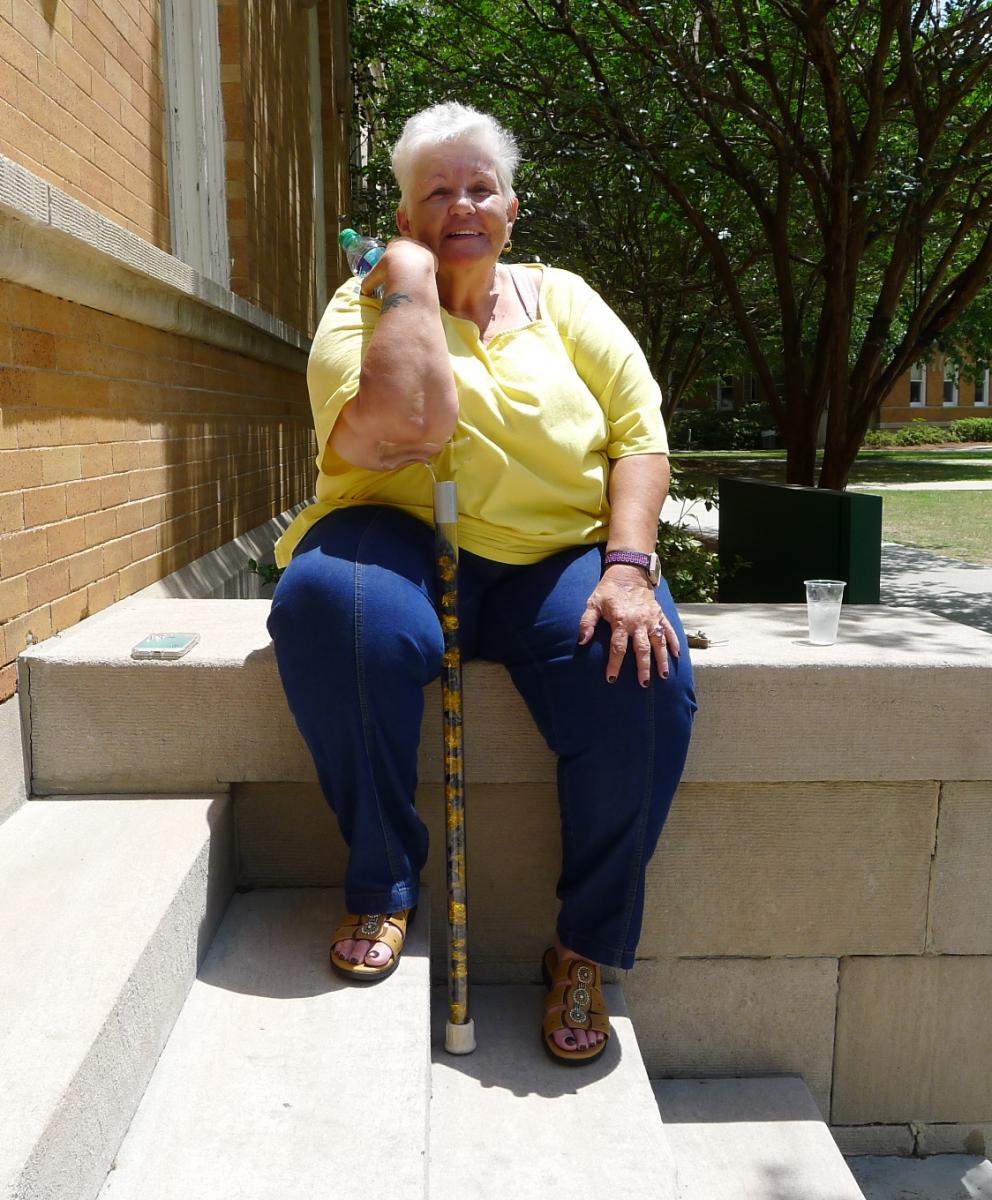
The Tulane History Department mourns the passing of Donna Denneen, our longtime Executive Assistant and Operations Manager, on April 23 from complications related to the Covid-19 virus. Donna came to Tulane twenty years ago, from a position at Xavier and before that from Boston, where she was raised. She quickly brought order to the administration of the department and became essential support to our teaching and research. Her role in the work of the department is testified to, for instance, in the many heartfelt acknowledgments she received in the books published by the History faculty over the last two decades.
We will miss Donna’s patient help in matters large and small, and her great sense of humor. There was a store of aspirin in the main front office for faculty when a headache came on, but the most important emergency supply in the department was the jar of candy that sat in her office in the Hebert Annex, placed in a spot that could be easily reached by anyone – faculty, students, cleaners, lost visitors and others -- who stopped in to ask a question, say hello, or hear Donna’s wry take on the frustration of the day. Donna was devoted to her faith, and to her dog, Willis. And as anyone who visited her office knew, from the many pictures displayed prominently there, she absolutely doted on her five grandchildren. We extend our condolences to them and to her son, Ra’Heem “Rocque” Rogers.
In the upcoming weeks, the Department will plan a suitable memorial and a way for her colleagues and friends at Tulane and beyond to share reminiscences of her.
Fall 2020 Courses
What's offered next semester? Check out our history course offerings.
Open Fall 2020 Classes
- HISE 2210 Modern Germany, Professor Marline Otte
- HISE 2240 Russian Rulers & Tyrants, 900-1825, Professor Samuel Ramey
- HISE 2430 Modern Spain since 1700, Professor James Boyden
- HISL 2850 Central America Radicals, Professor Justin Wolfe
- HISL 2912 Latin American History in Cinema, Professor Felipe Cruz
- CLAS 2811 Hate Speech and Politics in the Ancient World, Professor Nathan Kish
New Methods Sections Added!
- HIST 3910-01 and 3910-02 Garden Parks & Green Spaces, Professor Linda Pollock
Faculty in the News
New Faculty Publication: Andy Horowitz
Katrina: A History, 1915-2015 (Harvard University Press, 2020)
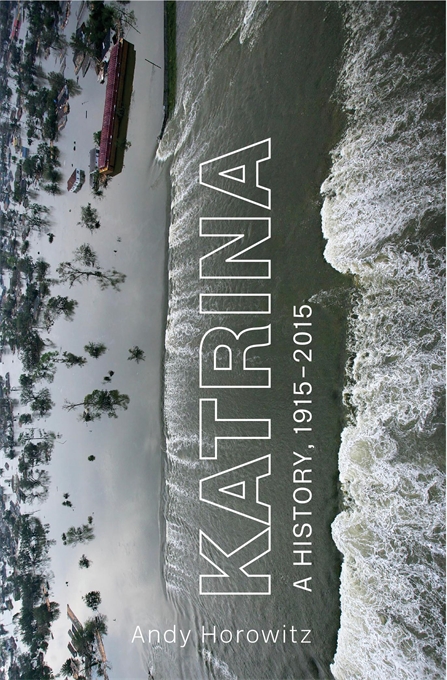 The definitive history of Katrina: an epic of citymaking, revealing how engineers and oil executives, politicians and musicians, and neighbors black and white built New Orleans, then watched it sink under the weight of their competing ambitions.
The definitive history of Katrina: an epic of citymaking, revealing how engineers and oil executives, politicians and musicians, and neighbors black and white built New Orleans, then watched it sink under the weight of their competing ambitions.
Hurricane Katrina made landfall in New Orleans on August 29, 2005, but the decisions that caused the disaster extend across the twentieth century. After the city weathered a major hurricane in 1915, its Sewerage and Water Board believed that developers could safely build housing away from the high ground near the Mississippi. And so New Orleans grew in lowlands that relied on significant government subsidies to stay dry. When the flawed levee system surrounding the city and its suburbs failed, these were the neighborhoods that were devastated. The homes that flooded belonged to Louisianans black and white, rich and poor. Katrina’s flood washed over the twentieth-century city.
The flood line tells one important story about Katrina, but it is not the only story that matters. Andy Horowitz investigates the response to the flood, when policymakers reapportioned the challenges the water posed, making it easier for white New Orleanians to return home than it was for African Americans. And he explores how the profits and liabilities created by Louisiana’s oil industry have been distributed unevenly among the state’s citizens for a century, prompting both dreams of abundance—and a catastrophic land loss crisis that continues today.
Laying bare the relationship between structural inequality and physical infrastructure—a relationship that has shaped all American cities—Katrina offers a chilling glimpse of the future disasters we are already creating.
New Faculty Publication: Jana Lipman
In Camps: Vietnamese Refugees, Asylum Seekers, and Repatriates (Oakland: University of California Press) 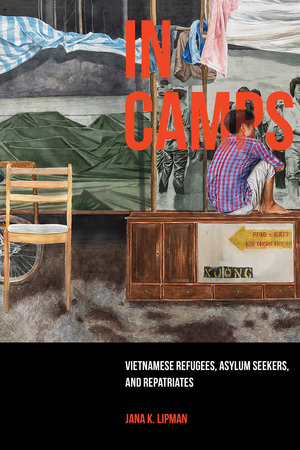 After the US war in Vietnam, close to 800,000 Vietnamese left the country by boat, survived, and sought refuge throughout Southeast Asia and the Pacific. This is the story of what happened in the camps. In Camps raises key questions that remain all too relevant today: Who is a refugee? Who determines this status? And how does it change over time?
After the US war in Vietnam, close to 800,000 Vietnamese left the country by boat, survived, and sought refuge throughout Southeast Asia and the Pacific. This is the story of what happened in the camps. In Camps raises key questions that remain all too relevant today: Who is a refugee? Who determines this status? And how does it change over time?
From Guam to Malaysia and the Philippines to Hong Kong, In Camps is the first major work on Vietnamese refugee policy to pay close attention to host territories and to explore Vietnamese activism in the camps and the diaspora. This book explains how Vietnamese were transformed from de facto refugees to individual asylum seekers to repatriates. Ambitiously covering people on the ground—local governments, teachers, and corrections officers—as well as powerful players such as the UN High Commissioner for Refugees and the US government, Jana Lipman shows that the local politics of first asylum sites often drove international refugee policy. Unsettling most accounts of Southeast Asian migration to the US, In Camps instead emphasizes the contingencies inherent in refugee policy and experiences.
Special Guests Visit with Virtual Classrooms

Madeleine Albright visits Prof. Isaacson's Digital Revolution class. Other special guests included AOL founder Steve Case.
2020 Award Winners
Undergraduate Awards
The Sidney Beyer Prize for Excellence in American History:
Sophie Vigeland
The Charles Till Davis Prize for Excellence in European History:
Jackson Faulkner
Prize for Excellence in Latin American, Middle Eastern, African, or Asian History:
Frances Currie
The Aline Mackenzie Taylor Award in Intellectual History:
Jasmine Gloria
The Mary B. Scott Memorial Prize in the Social Sciences:
Callie Belback
The S. Walter Stern 1905 Memorial Medal:
Dylan Borne
Senior Scholar, Honors Program:
Andrew Cerise
Awards for Overall Excellence
Chi Omega Prize in History:
Claire Demorest
Montgomery History Award:
Andrew Cerise
Jackson Faulkner
Graduate Awards
The Peter T. Cominos Memorial Award:
Anna Morgan Leonards
Given by the History Department annually for the best graduate paper of publishable quality. The paper will be selected by a three-person committee consisting of representatives from three different geographic subfields. The paper should demonstrate the highest professional standards of research, writing and analysis. Students interested in submitting a paper for the Award should provide four printed copies of the work to the Director of Graduate Studies. Due Date: March 1. Entries are limited to work produced in the previous calendar year. The award is announced at the end of the academic year.
The William R. Hogan Award:
D. Caleb Smith
Awarded annually by the History Department to a graduate teaching instructor in the History Department who has demonstrated particular excellence in teaching in the previous calendar year. The Graduate Studies Committee of the Department selects the candidate based upon mandatory student evaluations and written faculty evaluations. The award is announced at the end of the academic year
Senior Honors Theses
Dylan Borne
 For my thesis, I wrote about US Marxist theories on China in the 1970s and 1980s.
For my thesis, I wrote about US Marxist theories on China in the 1970s and 1980s.
In the late 1960s, Marxists in the United States looked up to China for its new socialist model and fierce opposition to empire. China inspired US Marxists to combine egalitarian ideals with anti-colonial nationalist traditions. Through this ideological combination, these militants built serious momentum for themselves and for revolutionary movements.
But in the following two decades, capitalism, socialism, and social movements restructured worldwide. Right-wing leaders of the United States successfully pushed a program of “neoliberalism." This meant privatization, attacks on labor, coercive debts for the global South, and cuts to social services at home. China had to reform its political economy to adapt, radical movements weakened, and US Marxists had to make sense of what was going on.
Many political scientists have studied neoliberalism, economists have written about China’s reforms, and historians have analyzed the decline of US radicalism. My focus on US Marxism highlights the development of the ideology’s unique partnership between socialist and anti-colonial traditions. This intellectual history draws from archived newspapers, magazines, theoretical journals, and pamphlets from the Amistad Research Center, the Howard-Tilton Memorial Library, George Washington University’s Leo Deaner Left-Wing Publications Collection, and Howard University’s Moorland-Spingarn Research Center.
I chose a historical approach for a political-economic subject to supplement quantitative social scientific research with qualitative analysis of the assumptions and ideas that precede methodology. I found that US Marxism’s ideological combination made for sometimes creative tensions, and other times destructive ones. These activists’ hopes, decisions, values, theories, and debates mattered as much to radicalism's history as the political and economic forces beyond their control.
Andrew Cerise
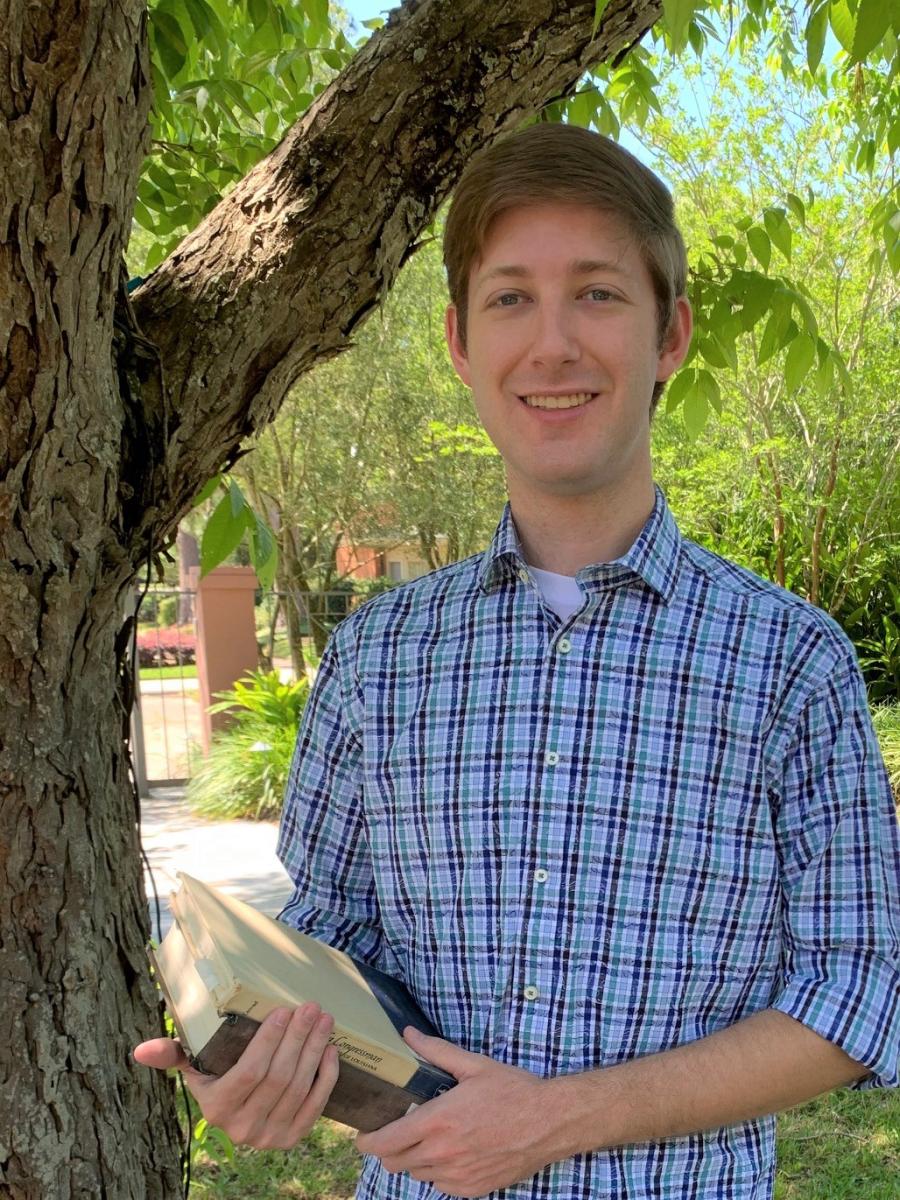 When I began considering my thesis topic, I wanted to write about American conservatism and its evolution through the 20th century. During my first meeting with my primary advisor, Professor Andy Horowitz, he was quick to point out that I could not possibly cover the field with sufficient depth to produce of an insightful or revelatory thesis. We decided to limit the scope of the thesis to F. Edward Hébert: a former representative from the First Congressional District and Chairman of the House Armed Services Committee who was virulently anti-communist, unapologetically racist, and staunchly conservative. Moreover, the Louisiana Research Collection (LaRC), located on the second floor of the Joseph Merrick Jones building, owns the collection of his congressional and personal papers, which have remained largely unexplored since their acquisition by LaRC.
When I began considering my thesis topic, I wanted to write about American conservatism and its evolution through the 20th century. During my first meeting with my primary advisor, Professor Andy Horowitz, he was quick to point out that I could not possibly cover the field with sufficient depth to produce of an insightful or revelatory thesis. We decided to limit the scope of the thesis to F. Edward Hébert: a former representative from the First Congressional District and Chairman of the House Armed Services Committee who was virulently anti-communist, unapologetically racist, and staunchly conservative. Moreover, the Louisiana Research Collection (LaRC), located on the second floor of the Joseph Merrick Jones building, owns the collection of his congressional and personal papers, which have remained largely unexplored since their acquisition by LaRC.  The research was substantial. Hébert’s thirty-six years as a representative in the House resulted in a collection of 900 boxes of material. I limited my research to documents related to Hébert’s congressional character and actions, resulting in a meticulous cataloguing of over 1,200 citations from tens of thousands of onion-skin documents in over 100 boxes. As the citations piled up, Hébert’s character as a conservative politician emerged with harrowing implications. Hébert’s primary motivator as a politician was to guarantee victory. As a newspaperman, Hébert exposed political corruption in the state during the Louisiana Scandals but joined the Long-era political machines to guarantee his re-election. His drive to consolidate power extended from politics to race in the form of white supremacy and his eager advocacy for the ultra-segregationists of Louisiana and
The research was substantial. Hébert’s thirty-six years as a representative in the House resulted in a collection of 900 boxes of material. I limited my research to documents related to Hébert’s congressional character and actions, resulting in a meticulous cataloguing of over 1,200 citations from tens of thousands of onion-skin documents in over 100 boxes. As the citations piled up, Hébert’s character as a conservative politician emerged with harrowing implications. Hébert’s primary motivator as a politician was to guarantee victory. As a newspaperman, Hébert exposed political corruption in the state during the Louisiana Scandals but joined the Long-era political machines to guarantee his re-election. His drive to consolidate power extended from politics to race in the form of white supremacy and his eager advocacy for the ultra-segregationists of Louisiana and 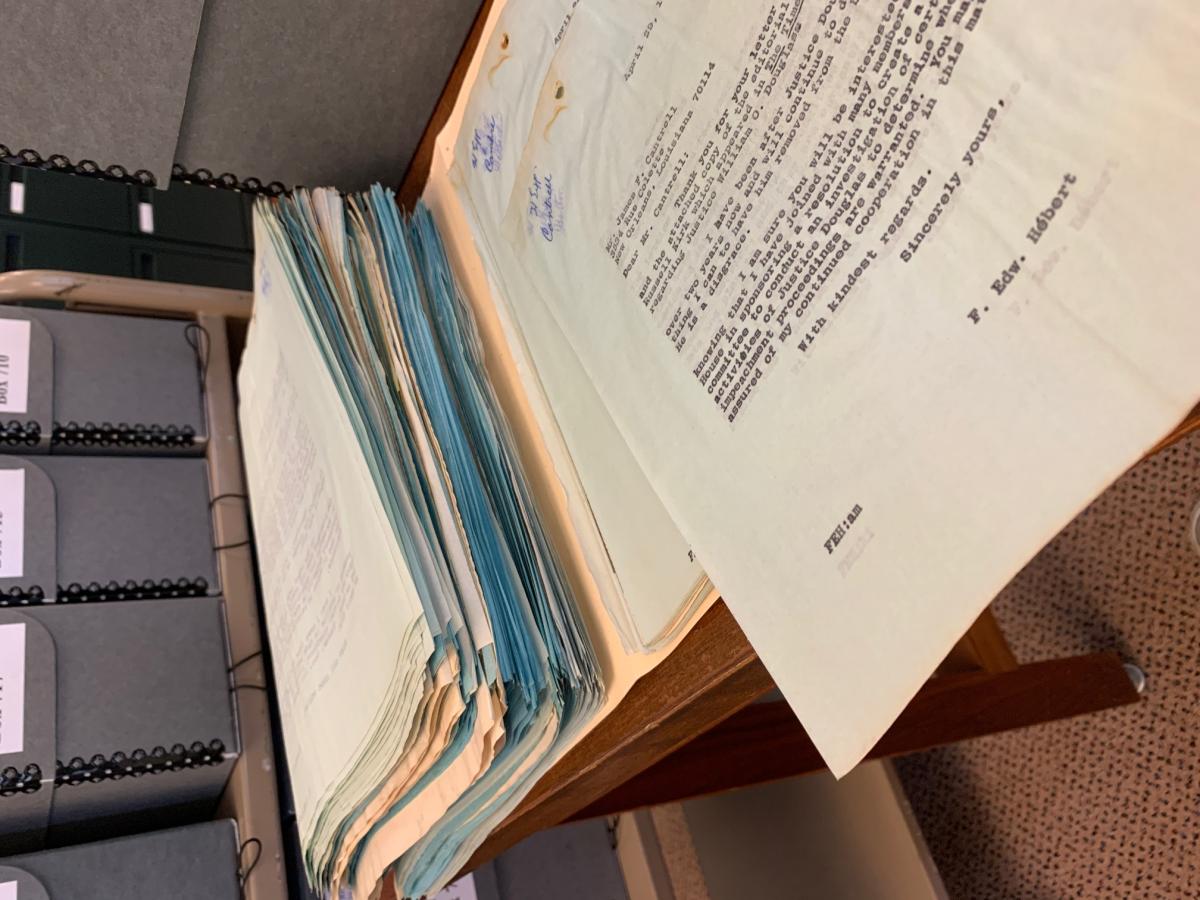 throughout the South. Nationally, Hébert joined with congressional conservatives in demanding the costly entrance and continuation of the Vietnam War to preserve the ideological integrity of conservative foreign policy. The need for victory at all costs—whether it be political, philosophical, ideological, or historical—galvanized Hébert to intervene in the My Lai massacre courts-martial and sabotage the trials to save the conservative narrative of American moral exceptionalism. Hébert’s political career exposed his own Machiavellian pursuit of power and the lengths to which he would go to ensure the continuation of his own ideological narrative. The populist character of Hébert’s conservatism, which we now see in the Trump Era, suggests that Hébert and like-minded politicians from the American South and Midwest were the true founders of modern American conservatism.
throughout the South. Nationally, Hébert joined with congressional conservatives in demanding the costly entrance and continuation of the Vietnam War to preserve the ideological integrity of conservative foreign policy. The need for victory at all costs—whether it be political, philosophical, ideological, or historical—galvanized Hébert to intervene in the My Lai massacre courts-martial and sabotage the trials to save the conservative narrative of American moral exceptionalism. Hébert’s political career exposed his own Machiavellian pursuit of power and the lengths to which he would go to ensure the continuation of his own ideological narrative. The populist character of Hébert’s conservatism, which we now see in the Trump Era, suggests that Hébert and like-minded politicians from the American South and Midwest were the true founders of modern American conservatism.
Claire Demorest
 My honors thesis entitled “The Parliament and the President: A Comparative Study of English and American Democracies, and the Systems of Representative Government in Nineteenth Century Reform,” is rooted in my majors of History and Political Science. Utilizing two case studies from the nineteenth century, I compared the American presidential democratic system and the English parliamentary democratic system, and their respective influence on the efficacy of representational reform. The case studies in question were the Reform Act of 1832 and the Reconstruction Amendments. Ultimately, I found that the lack of a codified constitution in the English parliamentary system, as well as the customary role of public opinion and engagement and the detached role of the executive (the king) all enabled the system to produce a more efficient and successful reform in the nineteenth century, as well as starring England on the path to expanded (and eventually universal) suffrage in the following century. The thesis concludes with musings on the potential for reform in the American democracy to improve the efficacy of representational reform, such as a closer examination of the amendment process, and reforming the medium to cultivate more successful implementation and development of reforms.
My honors thesis entitled “The Parliament and the President: A Comparative Study of English and American Democracies, and the Systems of Representative Government in Nineteenth Century Reform,” is rooted in my majors of History and Political Science. Utilizing two case studies from the nineteenth century, I compared the American presidential democratic system and the English parliamentary democratic system, and their respective influence on the efficacy of representational reform. The case studies in question were the Reform Act of 1832 and the Reconstruction Amendments. Ultimately, I found that the lack of a codified constitution in the English parliamentary system, as well as the customary role of public opinion and engagement and the detached role of the executive (the king) all enabled the system to produce a more efficient and successful reform in the nineteenth century, as well as starring England on the path to expanded (and eventually universal) suffrage in the following century. The thesis concludes with musings on the potential for reform in the American democracy to improve the efficacy of representational reform, such as a closer examination of the amendment process, and reforming the medium to cultivate more successful implementation and development of reforms.
Jackson Faulkner
 My project, examining the history of slavery on the plantation that now makes up part of Tulane’s campus, was initially sparked by a desire to study Tulane and the Uptown’s relationship with, and silencing of, slavery. I had several threads I initially wanted to explore, and while I was walking in Audubon Park, I stumbled across a historic marker. It explained briefly, and in glowing praise, that Audubon Park and the surrounding area was once part of Louisiana's first commercial sugar plantation, the de Boré Plantation. I was taken aback that a place of such critical and painful historical significance had been mostly forgotten, or otherwise presented as a civic boon for Louisiana. When I dug even further, I realized that my house, most of my classrooms, and a significant part of the Uptown I called home, was once a part of this historically important plantation.
My project, examining the history of slavery on the plantation that now makes up part of Tulane’s campus, was initially sparked by a desire to study Tulane and the Uptown’s relationship with, and silencing of, slavery. I had several threads I initially wanted to explore, and while I was walking in Audubon Park, I stumbled across a historic marker. It explained briefly, and in glowing praise, that Audubon Park and the surrounding area was once part of Louisiana's first commercial sugar plantation, the de Boré Plantation. I was taken aback that a place of such critical and painful historical significance had been mostly forgotten, or otherwise presented as a civic boon for Louisiana. When I dug even further, I realized that my house, most of my classrooms, and a significant part of the Uptown I called home, was once a part of this historically important plantation.
My primary aim in writing my thesis was to document this history critically, with an eye on the contemporary memory of the plantation today and that memory’s relationship with Tulane and Audubon Park. Soon I began to trace the history of the enslaved individuals and families on the plantation, as well as the detailed violent labor regime that extracted their labor for the benefit of the de Boré family. I tried to write a narrative that decentralized the de Boré family and examined the space as a complex and diverse creation, which 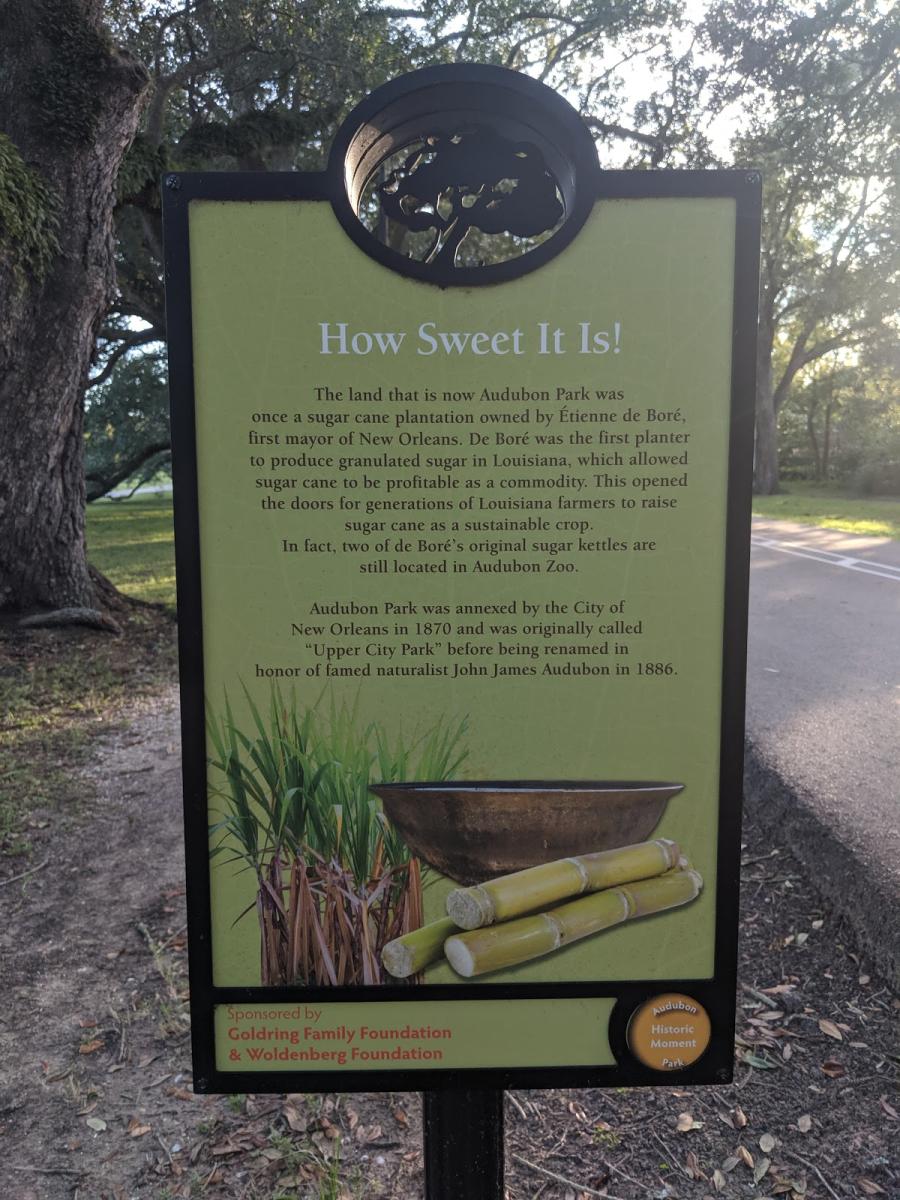 had been the home of an equally diverse and complex community of enslaved individuals, without losing focus on telling the violent truth of slavery in the larger space. I utilized estate and court records that cataloged Etienne de Boré’s property at the time of his death as well as the death of his daughter only a few years later to unravel the plantations scale and operations. I also utilized a detailed primary narrative of the plantation written for Harpers by Etienne’s grandson, Charles Gayarré, which served as a crucial resource in piecing together the day to day operations of slavery on the plantation. This effort was bolstered by several primary accounts concerning the de Boré family and their plantation, including Laussat’s seminal memoir. As I turned to the modern history of the space, I critically examined travel brochures, public markers, as well as geographical data to map the plantation’s rough boundaries over the modern Uptown. If there is a central finding to my work it is that Tulane rests upon a historically important plantation with a history of both brutal exploitation and a complex relationship with the continuation of white supremacy. I hope that my work explores a critical part of our community's history that so far has escaped the critical attention it deserves.
had been the home of an equally diverse and complex community of enslaved individuals, without losing focus on telling the violent truth of slavery in the larger space. I utilized estate and court records that cataloged Etienne de Boré’s property at the time of his death as well as the death of his daughter only a few years later to unravel the plantations scale and operations. I also utilized a detailed primary narrative of the plantation written for Harpers by Etienne’s grandson, Charles Gayarré, which served as a crucial resource in piecing together the day to day operations of slavery on the plantation. This effort was bolstered by several primary accounts concerning the de Boré family and their plantation, including Laussat’s seminal memoir. As I turned to the modern history of the space, I critically examined travel brochures, public markers, as well as geographical data to map the plantation’s rough boundaries over the modern Uptown. If there is a central finding to my work it is that Tulane rests upon a historically important plantation with a history of both brutal exploitation and a complex relationship with the continuation of white supremacy. I hope that my work explores a critical part of our community's history that so far has escaped the critical attention it deserves.
History Department Newsletter Archive:
- 06/2020 - History Newsletter - June 2020
- 11/2019 - History Newsletter - November 2019
- 09/2019 - History Newsletter - September 2019
- 03/2019 - History Newsletter - March 2019
- 02/2019 - History Newsletter - February 2019
- 11/2018 - History Newsletter - November 2018
- 09/2018 - History Newsletter - September 2018
- 04/2018 - History Newsletter - April 2018
- 04/03/2018 - History Newsletter - March 2018
- 03/14/2018 - TODAY Film Screening: Hearts & Minds, 3/14 6:00pm
- 02/21/2018 - TODAY Film Screening: The Thin Blue Line, 2/21 6:00pm
- 02/19/2018 - Film Screening: The Thin Blue Line, 2/21 6:00pm
- 02/05/2018 - History Newsletter - February 2018
- 10/24/2017 - History Newsletter - October 2017
- 09/11/2017 - History Newsletter - September 2017
- 05/03/2017 - TONIGHT: Tulane Student Documentary Screening
- 05/02/2017 - Tulane Student Documentary Screening - Wednesday, May 3, 7:00pm
- 04/18/2017 - TODAY: Film Screening - "When We Were Kings" - April 18, 6pm
- 04/16/2017 - Film Screening - "When We Were Kings" - April 18, 6pm
- 04/11/2017 - Film Screening - "Two Towns of Jasper"
- 04/04/2017 - Film Screening - "The Act of Killing"
- 03/20/2017 - Film Screening - "The Word in the Woods / La Palabra en el Bosque"
- 03/14/2017 - History Newsletter - March 2017
- 03/07/2017 - Film Screening - "The Good Fight"
- 03/01/2017 - Film Screening - "The Missing Picture"
- 02/20/2017 - Film Screening - "The Fog of War"
- 02/14/2017 - Film Screening and Pizza - "The Wanted 18"
- 02/07/2017 - History Film Screening! Tonight!
